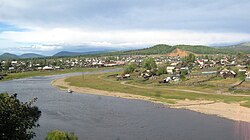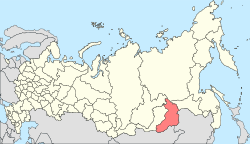Mogocha
| Mogocha (English) Могоча (Russian) |
|
|---|---|
| - Town - | |
 View of Mogocha |
|
 Location of Zabaykalsky Krai in Russia |
|
|
|
|
|
|
|
| Administrative status (as of January 2014) | |
| Country | Russia |
| Federal subject | Zabaykalsky Krai |
| Administrative district | Mogochinsky District |
| Administrative center of | Mogochinsky District |
| Municipal status (as of December 2012) | |
| Municipal district | Mogochinsky Municipal District |
| Urban settlement | Mogochinskoye Urban Settlement |
| Administrative center of | Mogochinsky Municipal District, Mogochinskoye Urban Settlement |
| Statistics | |
| Population (2010 Census) | 13,258 inhabitants |
| Population (January 2014 est.) | 13,697 inhabitants |
| Time zone | YAKT (UTC+09:00) |
| Founded | 1910 |
| Town status since | 1950 |
| Postal code(s) | 673730–673732, 673779 |
| Dialing code(s) | +7 30241 |
| on | |
Mogocha (Russian: Могоча; IPA: [mɐˈgotɕə]) is a town and the administrative center of Mogochinsky District in Zabaykalsky Krai, Russia, located at the confluence of the Mogocha and Amazar Rivers, 709 kilometers (441 mi) northeast of Chita, the administrative center of the krai. Population: 13,258 (2010 Census);13,282 (2002 Census);17,847 (1989 Census).
The name "Mogocha" is derived from the river on which it stands, whose name comes from the Evenki word mongochi. This meaning of this word is ambiguous; it can be translated as golden valley, but also as belonging to the Mongo tribe.
It was founded in 1910, with the construction of the local section of the Trans-Siberian Railway. Rail traffic began in 1914. In addition to its status as a supply point for the railway, from the 1920s and 1930s it became the base for gold mining in the surrounding area. Town status was granted to it in 1950.
From 1947 until 1953, Mogocha was site for the Klyuchevlag prison labor camp of the gulag system. The camp held up to 3,000 prisoners at any one time, mainly used as forced labor for molybdenum and gold mining in the villages to the southwest of the town.
During the deterioration of Sino-Soviet relations in the 1950s, a large airbase was created near Mogocha, which hosted several helicopter regiments until the 1990s. The remoteness of Mogocha combined with the harsh climatic conditions, gave rise to the Soviet military slang expression God created Sochi, and Satan Mogocha.
...
Wikipedia

